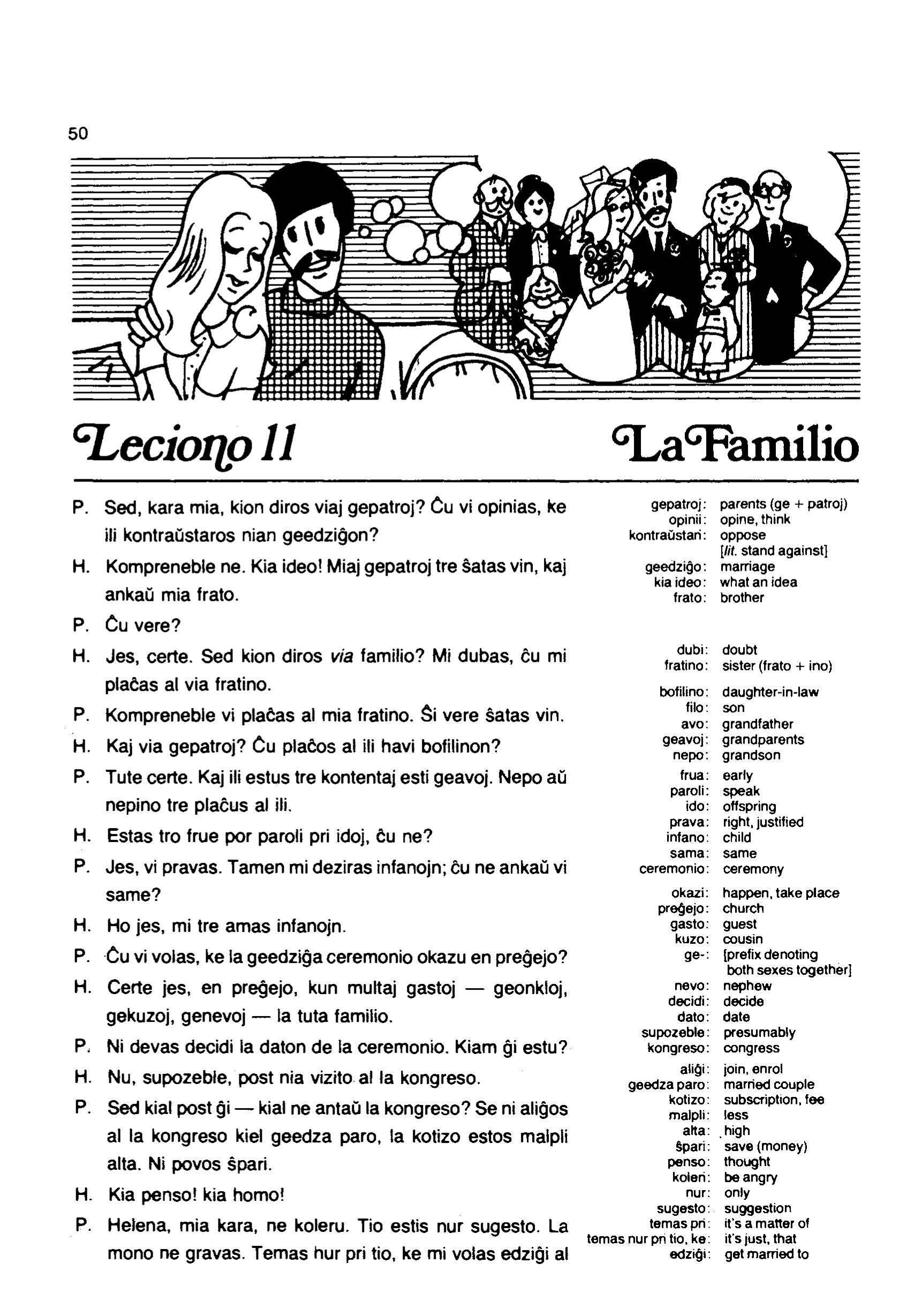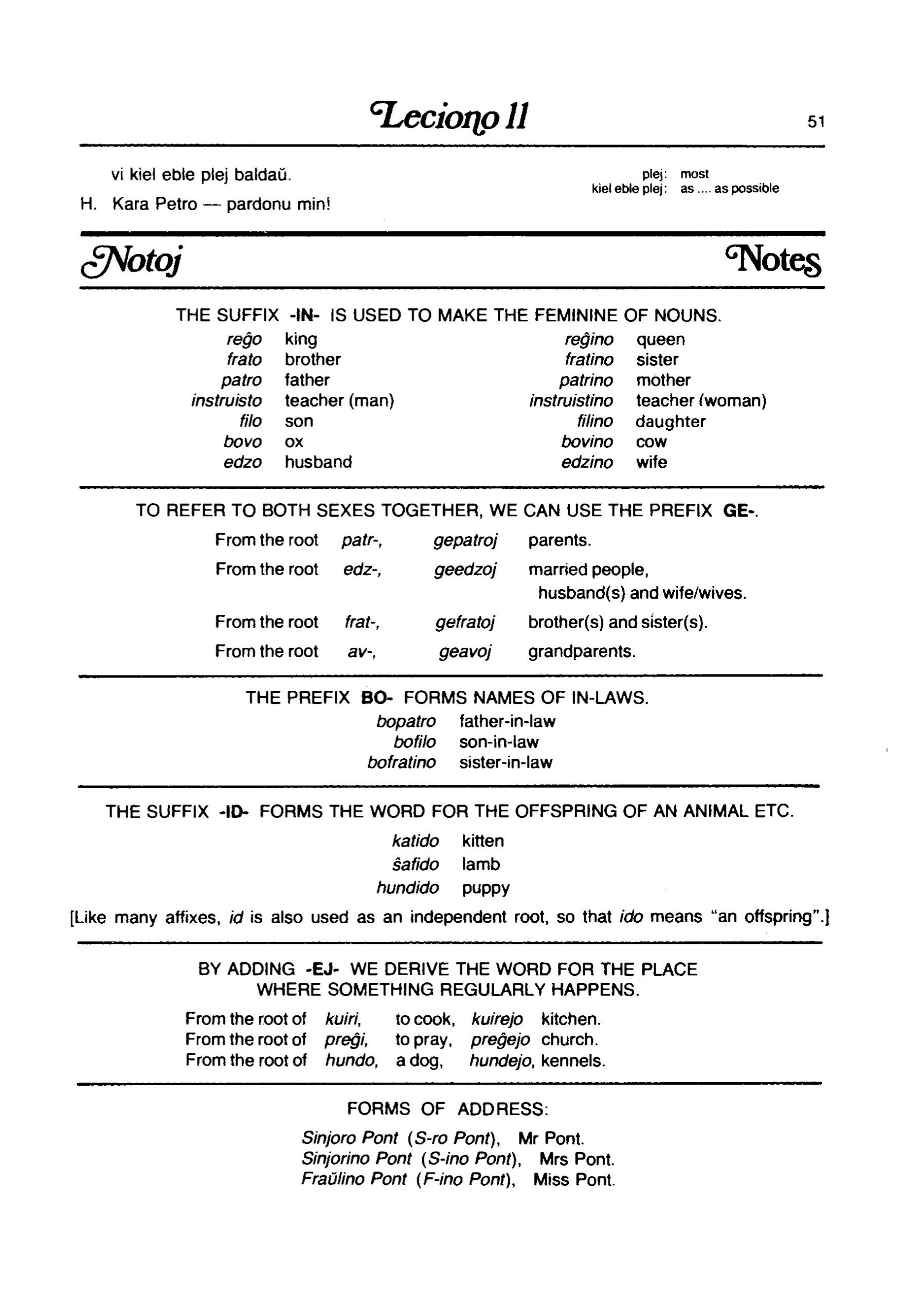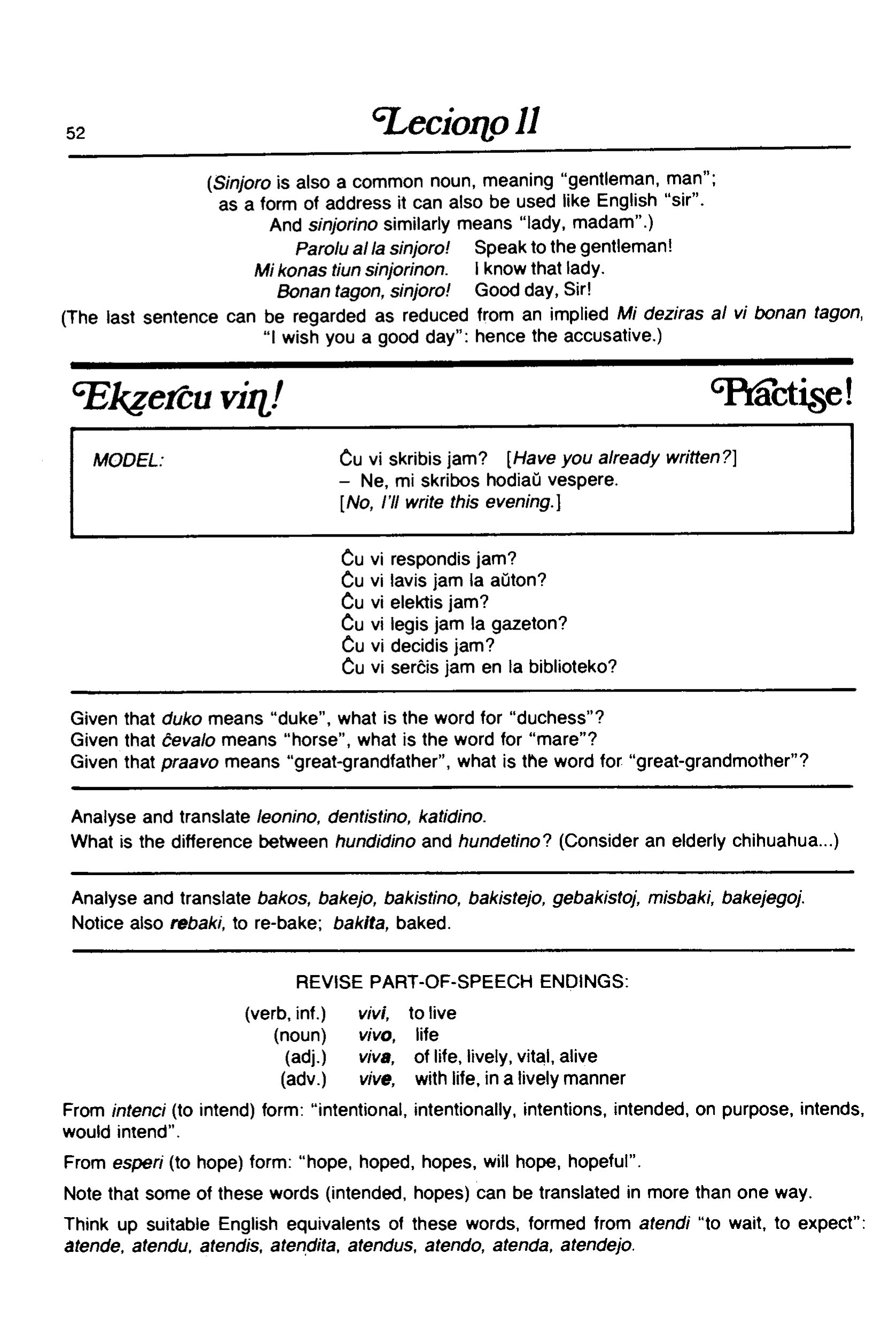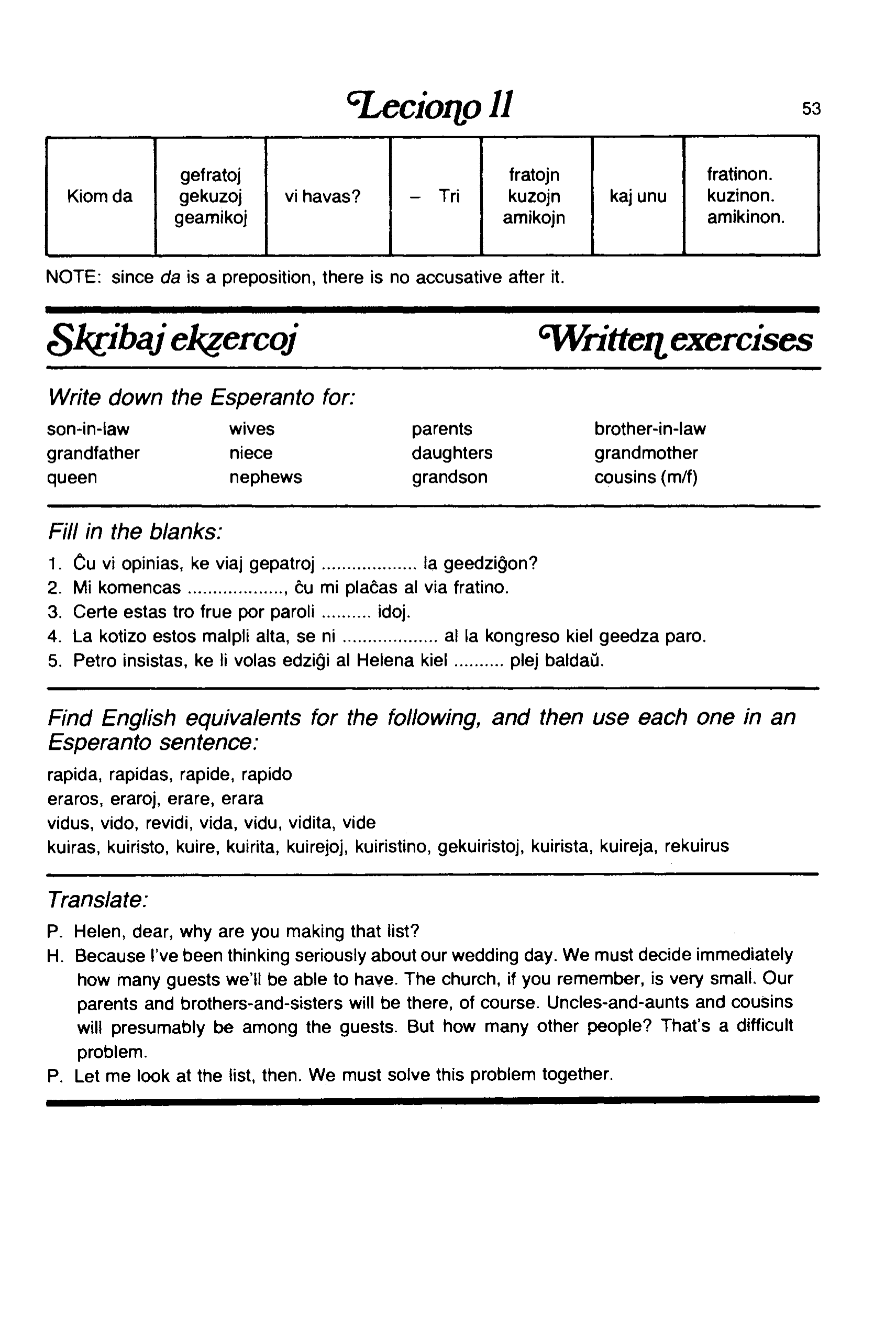





Sample Answers are offered below
We hope you are finding the vocabulary list after each lesson a useful tool for gathering ideas together. There is a summary of how Esperanto works (i.e. its grammar) in the second Appendix after Lesson 25. A bit is anticipated within the above exercise entitled ‘Revise Part-of-Speech Endings‘.
Please attempt the exercises before consulting the material below.
Lesson 11 Answers
Page 52
Ekzercu vin! – Exercise yourself!
Ĉu vi respondis jam? – Ne, mi respondos morgaŭ Have you replied already? – No, I’ll reply tomorrow.
Ĉu vi lavis jam la aŭton? – Ne, mi lavos ĝin morgaŭ. Have you waŝed the car already? – No, I’ll waŝ it tomorrow.
Ĉu vi elektis jam? – Ne, mi elektos morgaŭ. Have you chosen already? No, I’ii choose tomorrow.
Ĉu vi legis jam la gazeton? – Ne, mi legos ĝin morgaŭ. Have you ready the paper already? No, I’ll read it tomorrow.
Ĉu vi decidis jam? – Ne, mi decidos morgaŭ. Have you already decided? No, I’ll decide tomorrow.
Ĉu vi serĉas jam en la biblioteko? – Ne, mi serĉos tie morgaŭ. Have you searched in the library already? No, I’ll searĉ there tomorrow.
Duko – dukino ĉevalo – ĉevalino praavo – praavino Duke – duchess horse – mare great-grandfather – great-grandmother
leonino – lioness dentistino – female dentist katidino – female kitten
Note: as in English ‘dentist’, ‘katido’ etc may be of either sex. The sex is not explicit. If it is necessary to emphasis the male sex, the custom is to use ‘vir’ as in ‘virkato’ – tomcat.
Hundidino – female puppy Hundetino – female little dog age not explicit.
Bakos – will bake bakejo – bakery bakistino – female baker bakistejo – a place for bakers (not necessary for baking) gebakistoj – bakers of both sexes (married status not explicit!) misbaki – bake in error or badly bakejegoj – super bakeries
Revise Part-of-Speech Endings – Note; The rule here is that if the root plus ‘ending’ makes sense then it is legitimate. These endings are really ‘classes’ or ‘categories’ with their own broad meanings not readily expressed in English. Have a go at expressing their meaning! An equivalent in English might be ‘-ly‘ which often indicates an action or quality is being modified.
intenci > intenca – intentional intence– intentionally intencoj – intentions intencita – intended intencita – on purpose intencas – intends intencus – would intend
Note: ‘-it‘ is explored fully in lesson x. Unfortunately English uses ‘-s’ for plurals (but not all of them) and for third person singular verbs, so ‘-s’ as an ending does not carry unique meaning in itself.
esperi > espero – hope esperita – hoped esperas – hopes / esperoj – hopes esperos – will hope esperplena – hopeful
Note: traditionally ‘espera’ is not considered to be sufficiently clear. Perhaps it means ‘with hope‘
atendi – wait, expect > atende – (in) waiting atendu – wait! atendis – waited atendita – (a)waited atendus – would wait (if necessary) atendo – waiting atenda – for waiting atendejo – waiting room
Page 53
Kiom da gefratoj vi havas? [Mi havas] tri fratojn kaj unu fratinon – How many brothers and sisters do you have? [I’ve] three brothers and one sister.
Kiom da gekuzoj vi havas? [Mi havas] tri kuzojn kaj unu kuzinon – How many cousins male or female do you have? [I’ve] three male cousins and one female one.
Kiom da geamikoj vi havas? [Mi havas] tri amikojn kaj unu amikinon – How many friends male or female do you have? [I’ve] three male friends and one female one.
Note: ‘da’ means ‘amount of’
Skribaj Ekzercoj – Writing Exercises
bofilo – son-in-law edzinoj – wives gepatroj – parents (fathers and mothers) gefrato – brother-in-law avo – grandfather nevino – niece filinoj – daughters avino – grandmother reĝino – queen nevoj – nephews nepo – grandson gekuzoj – male and female cousins
1. Ĉu vi opinias, ke viaj gepatroj ŝatos la geedziĝon?
2. Mi komencas dubi, ĉu mi plaĉas al via fratino?
3. Certe estas tro frue por paroli pri idoj
4. La kotizo estos malpli alta, se ni iros al al kongreso kiel geedza paro.
5. Petro insistas, ke li volas edziĝo al Helena kiel eble plej baldaŭ
Note: La kotizo estos malpli alta, se ni iros al la kongreso kiel geedza paro. The fee will be lower (less high) , if we go to the congress as a married couple. This emphasises the fact.
La kotizo estus malpli alta, se ni irus al la kongreso kiel geedza paro. The fee would be lower (less high) , if we were to go to the congress as a married couple. This emphasises the conditionality!
rapida – quick, fast rapidas – be fast, quick rapide – quickly, speedily rapido – speed
Li estas la plej rapida leganto en la klaso
La hundo tro rapidas inter la homoj
Ŝi respondis rapide ĉar ŝi bone komprenis la parolon.
Mia rapido estas certe mapli ol via, ĉar vi iras per aŭto
eraros – will make mistakes eraroj – errors erare – by mistake erara – mistaken
Se ni kantos tor rapide ni eraros pli ofte
Kiom da eraroj vi faris hodiaŭ?
Ŝi erare diris ‘kiel’ anstataŭ ‘kial’
Ili havas multajn erarajn opiniojn
vidus – would see (if possible) vido – view revidi – see again vida – visual vidu – behold! vidita – seen vide – by sight
Se vi starus tie, vi vidus nenion – If you (were to) stand there, you would see nothing
Mia vido estas bona. Mi povas vidi multon. My view is good. I can see a lot.
Mi ne volas revidi tiun filmon. I do not want to see that film again.
Vidu mian bildon, mi petas. Ĝi ankaŭ estas bona. See my picture, please. It is a good picture too
Unufoje vidita, nenima forgesita Once seen, never forgotten
Aŭde vi ne haltus, vide vi ŝatus ĝin tuj.
kuiras – cooks kuiristo – cook kuire – by cooking kuirita – cooked kuirejoj – kitchens gekuiristoj – cooks male and female kuirista – cook’s kuireja – kitchen’s rekuirus – would cook again
Ŝi kuiras bone ĉiam – she always cooks well
Lia patrino estas malbona kuiristo – His mother is a bad cook
Mi vundis [wounded] mian fingron kuire. I hurt my finger cooking.
Tiu granda domo havas kelkajn kuirejojn – That big house has several kitchens
Mia fratino laboras kiel kuiristino – My sister works as a cook
Mi ne havas kuiristan ĉapelon, ĉu vi? – I don’t have a cook’s hat, have you [one]
La kuireja pordo estas rompita – The kitchen door is broken.
Mi ne volus manĝi tion se vi rekuirus ĝin – I would not want to eat that if you were to recook it.
Translate / Traduku
P. Helena, kara, kial ni faras tiun liston?
H. Ĉar mi jam pensas serioze pri nia geedziĝa tago. Ni devas decidi tuj kiom da gastoj ni povos havi. La preĝejo, se vi memoras, estas tre malgranda. Niaj gepatroj kaj gefratoj estos tie kompreneble. Geonkloj kaj gekuzoj estos supozeble inter la gastoj. Sed kiom da aliaj homoj? Tiu estas malfacila problemo
P. Mi vidu la liston. Ni devos solvi la problemon kune.
Lesson 11 Words to add to your vocabulary
Al/iĝi
Atend/i
Av/o
Bo/
Bov/o
Ceremoni/o
Decid/i
Dub/i
Duk/o
Edz/o
Ejo
Fil/o
Fraŭlin/o
Fru/a
Gast/o
Ge/
Id/o
ide/o
Ino
Kiel eble plej
Kongres/o
Join
Wait/expect
Grandfather
In-law
Ox
Ceremony
Decide
Doubt
Duke
Husband
Place (for), location
Son cf filial
Miss cf Fraulein
Early
Guest
Both sexes included
Offspring
Idea
Female
As much as possible
Congress
Kontraŭ
Kontraŭstar/i
Kotiz/o
Kuir/i
Kuz/o
Leon/o
Nep/o
Nev/o
Par/o
Plej
Pra
Preĝ/i
Preĝej/o
Re/
Reĝ/o
Sam/a
Sugest/i
Supozeble
Ŝpar/i
Tem/o
Against
Oppose, stand against
Subscription
Cook
Cousin
Lion
Grandson cf nepotism
Nephew
Pair, couple
Most
Remoter relative, great-
Pray
Church
Re-
King cf rex, regal
Same
Suggest
Presumably
Save up
Theme, subject